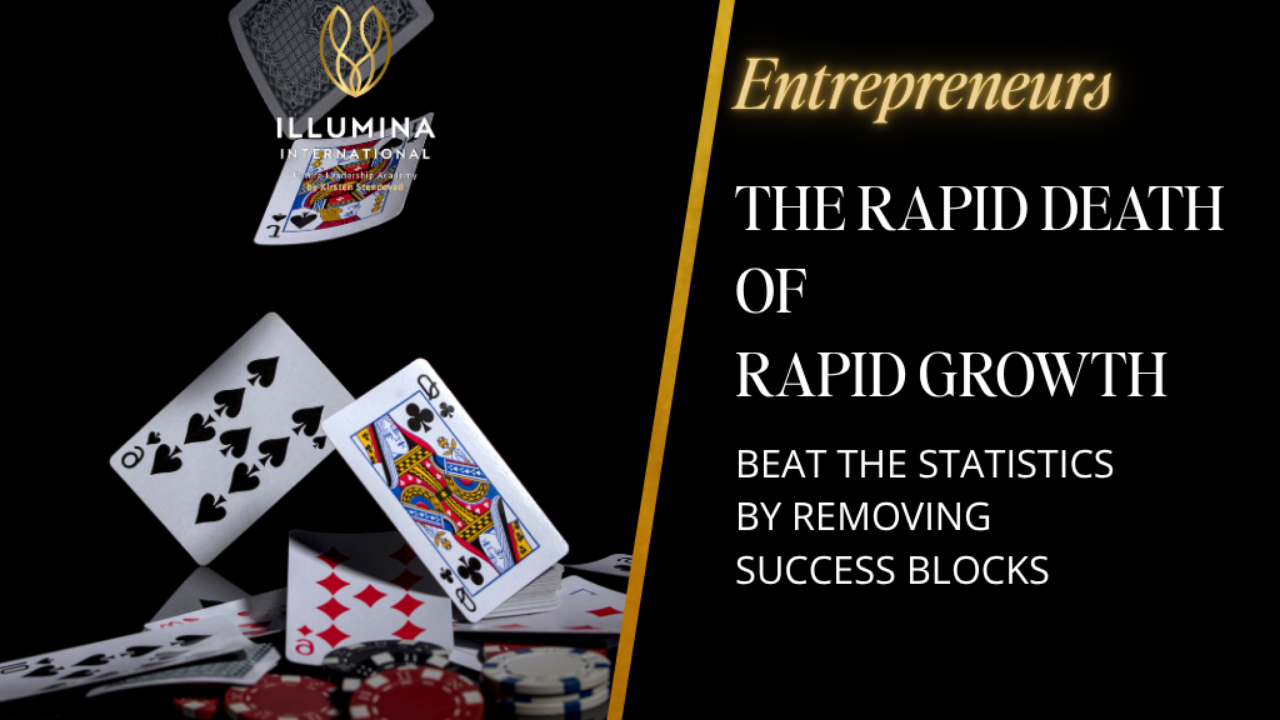The Rapid Death of Rapid Growth

By Kirsten Stendevad, Nordic author, speaker, and leadership developer
In the startup ecosystem, rapid growth has become the ultimate metric of success. Venture capitalists chase unicorns, entrepreneurs celebrate explosive user acquisition, and business media glorifies companies that scale from zero to billions in record time. Yet beneath this growth obsession lies a troubling reality: the very speed that propels companies to stardom often orchestrates their spectacular collapse.
The evidence is mounting across industries. High-flying companies that once dominated headlines—from WeWork's implosion to the struggles of numerous "growth at all costs" startups—reveal a consistent pattern: rapid expansion without sustainable foundations creates organizational brittleness that eventually shatters under its own weight.
The Fatal Flaw in the Growth Playbook
The core problem isn't growth itself, but the fundamental mismatch between how fast companies scale and how quickly they can build the organizational capacity to support that scale. While revenue and user bases can explode exponentially, the human systems, cultural foundations, and leadership capabilities that sustain organizations develop at a much slower, more organic pace.
This creates what researchers call the "capacity gap"—the dangerous chasm between what a company appears capable of achieving and what it can actually sustain. When this gap becomes too wide, even the most promising ventures face what can only be described as rapid organizational death.
The Anatomy of Unsustainable Growth
Several critical warning signs emerge when companies prioritize speed over sustainability:
Traditional command-and-control management structures, designed for smaller teams, become bottlenecks that strangle decision-making as organizations expand. What worked for a 20-person startup becomes a liability for a 200-person company, yet many leaders cling to familiar approaches rather than evolving their management philosophy.
Perhaps more dangerously, ego-driven leadership—where founders and executives make decisions based on personal vision rather than organizational capacity—becomes increasingly disconnected from operational reality. Leaders who built companies through force of will often struggle to transition to the collaborative, systems-thinking approach that larger organizations require.
The culture that fueled early success frequently fails to evolve alongside the organization, creating internal friction as new employees struggle to navigate unwritten rules and informal processes that worked in a garage but fail in multiple office locations.
The Sustainable Alternative: Teaching Organizations to Breathe
Forward-thinking leaders are discovering that the antidote to unsustainable growth isn't slower expansion—it's building organizations that can grow organically, like living systems rather than mechanical ones.
This transformation begins with a fundamental shift in leadership philosophy. Instead of commanding and controlling, leaders must learn to cultivate and connect. This means developing what experts call "systemic intelligence"—the ability to see how decisions ripple through interconnected organizational networks and affect long-term capacity.
At the strategic level, companies must abandon rigid, machine-like structures in favor of adaptive frameworks that can evolve with changing circumstances. This involves creating decision-making processes that push authority to the edges of the organization while maintaining alignment around core principles.
Most critically, successful scaling requires establishing what might be called "unified rules for a new game"—shared principles that guide behavior across all levels of the organization. These aren't traditional corporate policies, but rather cultural agreements about how people work together, make decisions, and navigate conflicts.
Building Future-Proof Organizations
Companies that master sustainable growth share several characteristics: they remain adaptable to rapid market changes while maintaining internal stability, they build resilience that allows them to absorb shocks without breaking, and they create alignment between their stated purposes and daily practices.
The investment community is beginning to recognize this shift. Smart investors are looking beyond growth metrics to evaluate organizational health, leadership adaptability, and cultural resilience. They're asking harder questions about whether portfolio companies can sustain their trajectory—and investing in the leadership development necessary to ensure they can.
The Path Forward
The most successful companies of the next decade won't be those that grow fastest, but those that grow most wisely. They'll be organizations where every employee—from the C-suite to the front lines—understands how to balance ambition with sustainability, how to pursue opportunities without sacrificing organizational health, and how to lead in ways that build rather than deplete collective capacity.
This isn't about slowing down; it's about speeding up intelligently. It's about recognizing that in our interconnected, rapidly changing business environment, the companies that survive and thrive will be those that learn to grow like living systems—adapting, evolving, and strengthening themselves from within.
The choice facing today's business leaders is clear: continue chasing unsustainable growth until organizational collapse becomes inevitable, or invest in building the leadership capabilities and cultural foundations that make rapid growth truly sustainable. The future belongs to those wise enough to choose the latter path.
For executives ready to transform their approach to growth, the time to act is now—before the next growth cycle reveals the fragility hiding beneath impressive metrics.
Your Next Step
At Illumina Future Leadership Academy, we help leaders, entrepreneurs, changemakers and their teams thrive today and shape a brighter tomorrow via regenerative resilience, turning crisis into opportunity, and developing AI-complementary human capabilities.
Our next cohorts are forming now.
Start immediately with brain
training that builds up to 25% more focus,
memory, and decision-making skills, plus the neuroplasticity that
maximizes your benefits and transformation when the group
trainings begin.
Schedule a call to explore if this upgrade answers your calling.
Stay connected with updates & news
Join our mailing list to stay in the loop
You can unsubscribe any time with one click
No spam. No sharing with third parties. Only bright ideas & insights. ILLUMINA is latin and means "Please Enlighten Me"


